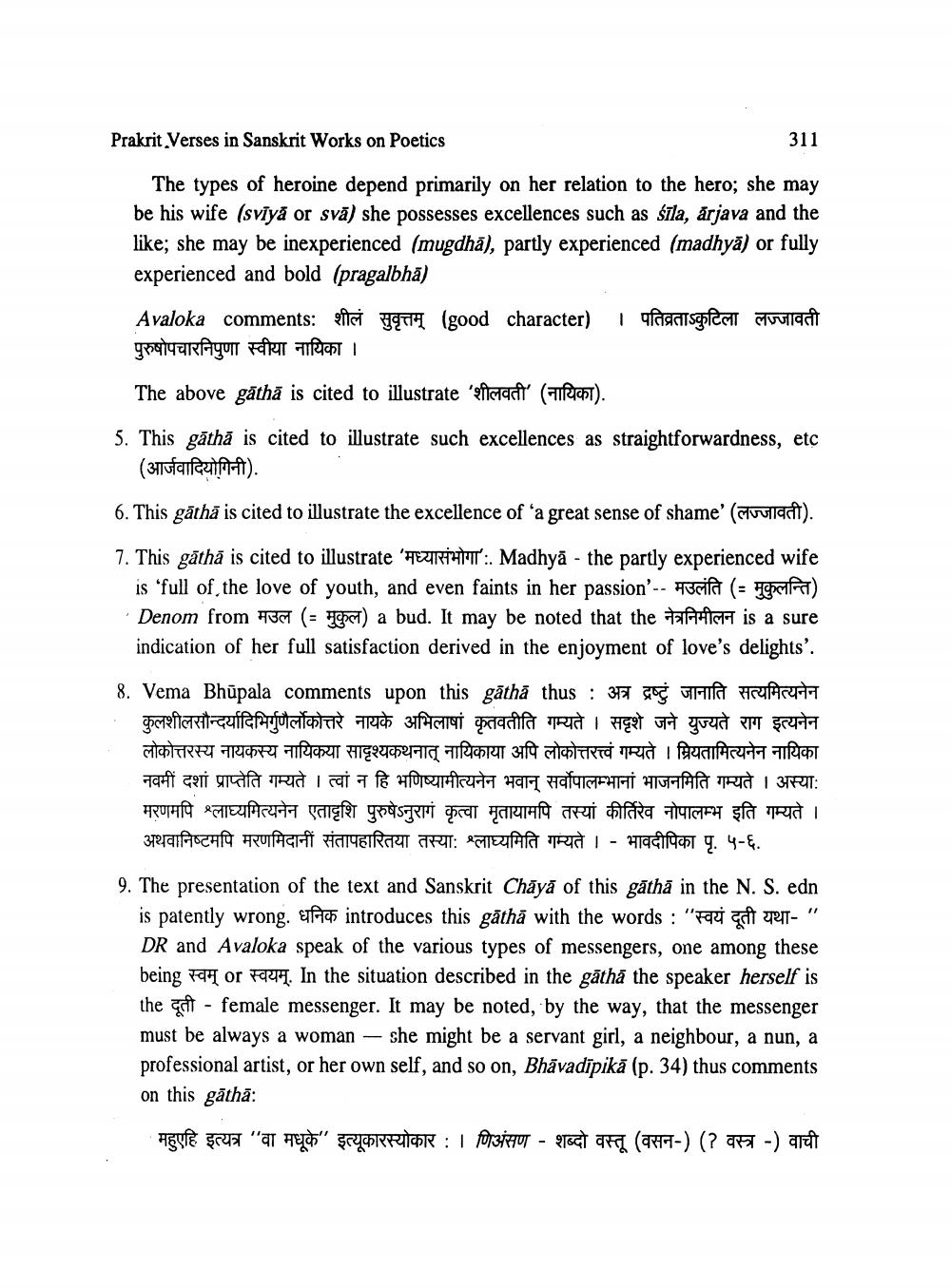________________
Prakrit Verses in Sanskrit Works on Poetics
311
The types of heroine depend primarily on her relation to the hero; she may be his wife (svīyā or svā) she possesses excellences such as śīla, årjava and the like; she may be inexperienced (mugdhā), partly experienced (madhyā) or fully experienced and bold (pragalbhā)
Avaloka comments: शीलं सुवृत्तम् (good character) । पतिव्रताऽकुटिला लज्जावती पुरुषोपचारनिपुणा स्वीया नायिका ।
The above gatha is cited to illustrate 'शीलवती' (नायिका).
5. This gātha is cited to illustrate such excellences as straightforwardness, etc
(आर्जवादियोगिनी).
6. This gāthā is cited to illustrate the excellence of a great sense of shame' (collari).
7. This gatha is cited to illustrate 'मध्यासंभोगा':. Madhya - the partly experienced wife
is full of the love of youth, and even faints in her passion'-- मउलंति (= मुकुलन्ति) • Denom from मउल (= मुकुल) a bud. It may be noted that the नेत्रनिमीलन is a sure indication of her full satisfaction derived in the enjoyment of love's delights'.
8. Vema Bhupala comments upon this gatha thus : अत्र द्रष्टुं जानाति सत्यमित्यनेन कुलशीलसौन्दर्यादिभिर्गुणैर्लोकोत्तरे नायके अभिलाषां कृतवतीति गम्यते । सदृशे जने युज्यते राग इत्यनेन लोकोत्तरस्य नायकस्य नायिकया सादृश्यकथनात् नायिकाया अपि लोकोत्तरत्वं गम्यते । म्रियतामित्यनेन नायिका नवमी दशां प्राप्तेति गम्यते । त्वां न हि भणिष्यामीत्यनेन भवान् सर्वोपालम्भानां भाजनमिति गम्यते । अस्याः मरणमपि श्लाघ्यमित्यनेन एतादृशि पुरुषेऽनुरागं कृत्वा मृतायामपि तस्यां कीर्तिरेव नोपालम्भ इति गम्यते । अथवानिष्टमपि मरणमिदानीं संतापहारितया तस्याः श्लाघ्यमिति गम्यते । - भावदीपिका पृ. ५-६.
9. The presentation of the text and Sanskrit Chāyā of this gātha in the N. S. edn is patently wrong. धनिक introduces this gatha with the words : "स्वयं दूती यथा- " DR and Avaloka speak of the various types of messengers, one among these being स्वम् or स्वयम्. In the situation described in the gatha the speaker herself is the cat - female messenger. It may be noted, by the way, that the messenger must be always a woman - she might be a servant girl, a neighbour, a nun, a professional artist, or her own self, and so on, Bhāvadipikā (p. 34) thus comments on this gātha:
महुएहि इत्यत्र "वा मधूके” इत्यूकारस्योकार : । णिअंसण - शब्दो वस्तू (वसन-) (? वस्त्र -) वाची




